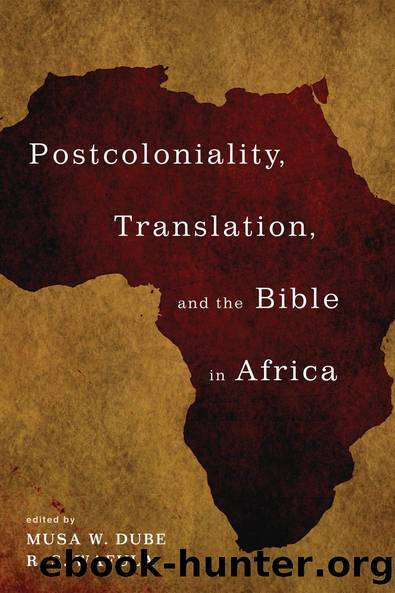Postcoloniality, Translation, and the Bible in Africa by Musa W Dube

Author:Musa W Dube [Dube, Musa W]
Language: eng
Format: epub
Tags: Nonfiction, Reference & Language, Language Arts, Translating & Interpreting, History, Africa
ISBN: 9781498295154
Amazon: B0757HZ9LC
Goodreads: 36710838
Publisher: Wipf and Stock Publishers
Published: 2017-07-14T04:00:00+00:00
Part II
Gender, Postcoloniality, and African Bible Translations
4
Translating the Divine
The Case of Modimo in the Setswana Bible305
Gomang Seratwa Ntloedibe-Kuswani
How do you translate the God of the Bible in terms of the âgodâ or âgodsâ of another culture? How do you change the categories and concepts of biblical religion to terms understood by those of native traditional religions? In general . . . the local gods, religious terminology, and categories are usually hijacked .and christianised, or infused with new biblical meaning. âAloo Osotsi Mojola
In many African cultures, for example, the name and concept of the deity are often female. It is also women who are responsible for the intervention between people and the deity. This concept was foreign to early missionary Bible translators, and most translations changed the word for God to adapt it to the Western, male God name. These kinds of translations, now accepted by churches, have helped to reverse the status of women in religious spheres, both in the church and in local cultures. âMusimbi R. A. Kanyoro
Long before the introduction of the Christian tradition in Africa, Africans had their own religious traditions, many of which have the concept of the Divine. For instance, Modimo of the Batswana, Unkulunkulu of the Zulu, Mwari of the Shona in Southern Africa, Olorun of the Yoruba in West Africa, Ngai of the Kikuyu, Nyasaye of the Luo in East Africa, Nzambi of the Bankongo of the Congo in Central Africa and many other names in other parts of Africa. The colonial mission Christianity had first thought that Africans had no conscious of the Divine or âSomething Other than the Ordinary.â This was a colonial rhetoric of subjugation. The same missionaries later identified names of the Divine among African languages, which they used in biblical translations. African scholarsâ challenge to colonizing Christianity led to changed attitudes toward Africa and Africanity (African Spirituality). The changed attitudes are reflected in some later writings of some missionaries and theologians. However, the change remains minimal in the Book of God, the translated Setswana Bible.
This essay focuses on the Batswana concept of the divine, Modimo. The usage of Modimo in Christian Theology is different from its usage in African Batswana theology. The difference is articulated by John Hickâs 1989 thesis; that modern awareness of religious plurality and conceptual relativity has brought about a new situation that sees religious thought and experience as a global continuum containing an immense variety of forms. Consequently, the discussions of religion have problems in defining concepts, precisely because each religious tradition has its own patterns. It is always a complex move, as this chapter demonstrates, to define the Divine that we mean by Allah of Islam, Brahman of Hinduism, Modimo of Batswana, Ngai of the Kikuyu, God of Christianity, Nyasayi of the Luo, Mwari of the Shona, YHWH of Judaism and Nzambi of the Bankongo. As the above quote from Aloo Osotsi Mojola indicates, this is precisely because we tend to try to understand various culturesâ portraits of the Divine through the dominant form of the Divineâin this case, the biblical God.
Download
This site does not store any files on its server. We only index and link to content provided by other sites. Please contact the content providers to delete copyright contents if any and email us, we'll remove relevant links or contents immediately.
Machine Learning at Scale with H2O by Gregory Keys | David Whiting(4313)
Never by Ken Follett(3955)
Fairy Tale by Stephen King(3396)
Reminders of Him: A Novel by Colleen Hoover(3116)
The Man Who Died Twice by Richard Osman(3077)
Will by Will Smith(2919)
It Starts With Us (It Ends with Us #2) by Colleen Hoover(2367)
Rationality by Steven Pinker(2363)
Can't Hurt Me: Master Your Mind and Defy the Odds - Clean Edition by David Goggins(2341)
Friends, Lovers, and the Big Terrible Thing by Matthew Perry(2230)
The Becoming by Nora Roberts(2201)
The Stranger in the Lifeboat by Mitch Albom(2121)
Love on the Brain by Ali Hazelwood(2075)
New Morning Mercies: A Daily Gospel Devotional by Paul David Tripp(1919)
A Short History of War by Jeremy Black(1848)
HBR's 10 Must Reads 2022 by Harvard Business Review(1844)
The Strength In Our Scars by Bianca Sparacino(1843)
A Game of Thrones (The Illustrated Edition) by George R. R. Martin(1744)
Never Finished: Unshackle Your Mind and Win the War Within by David Goggins(1712)
